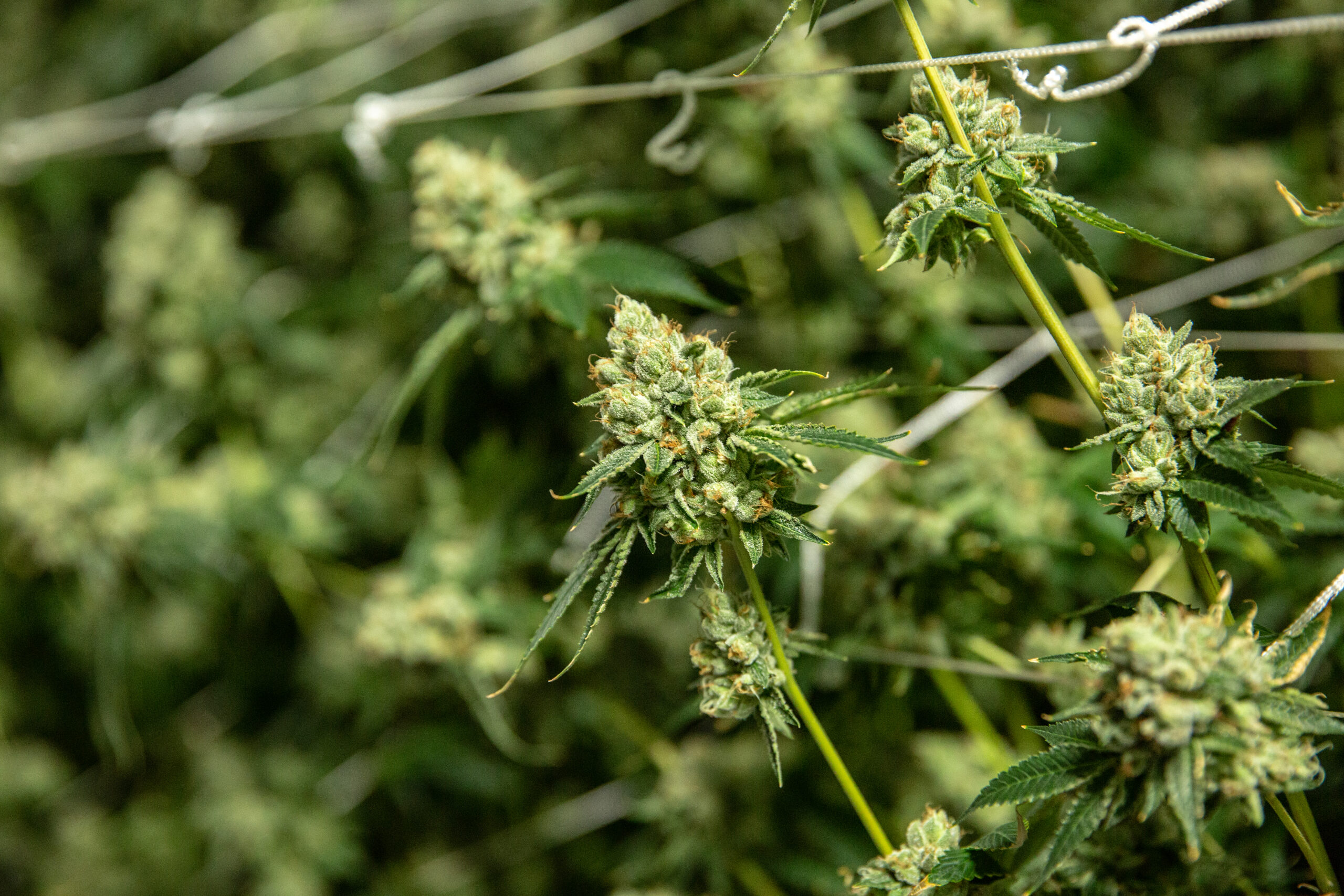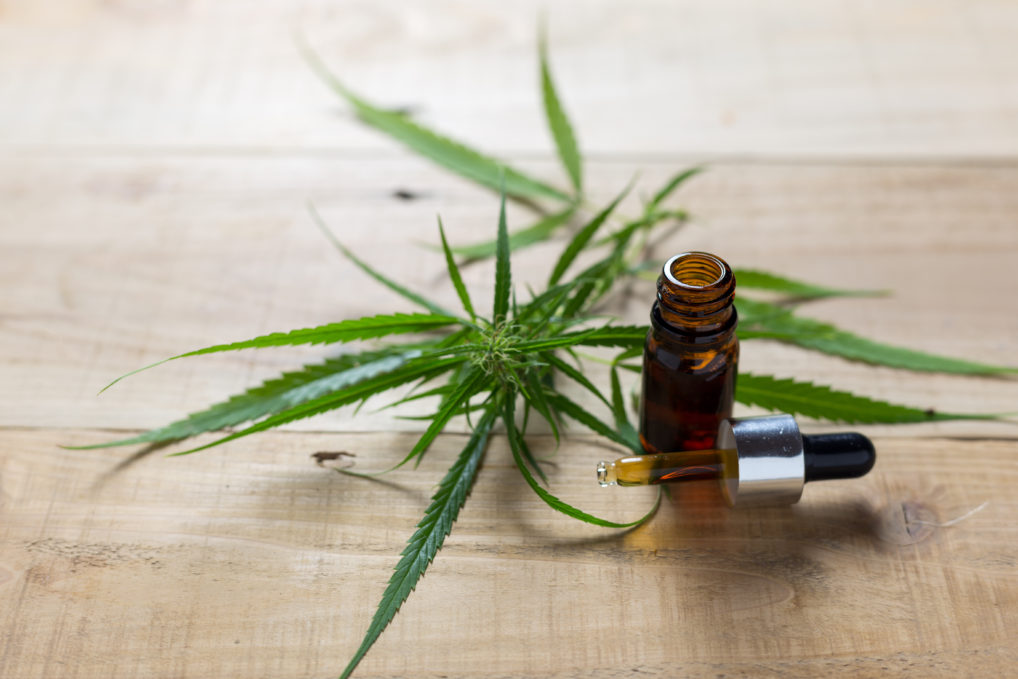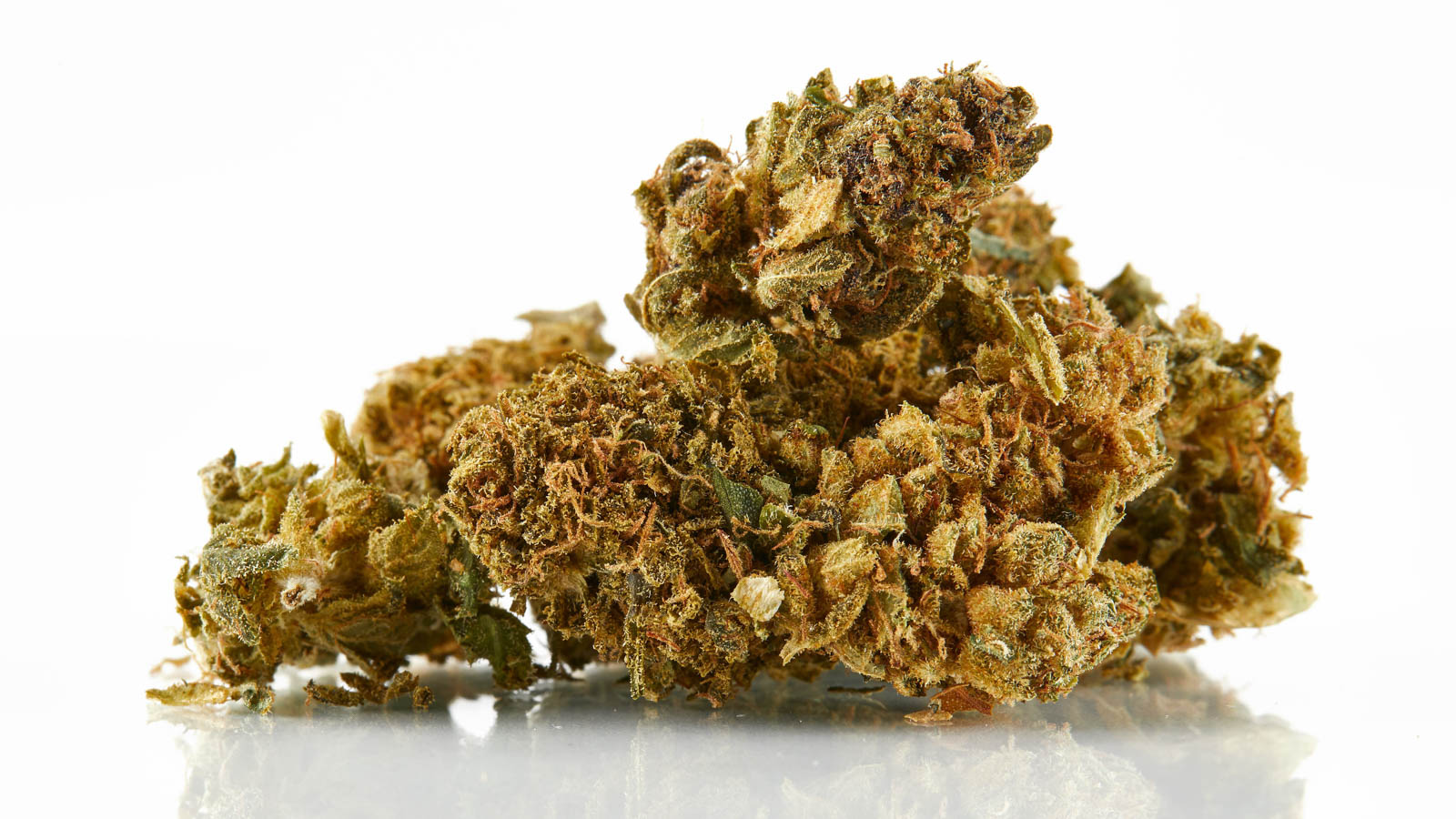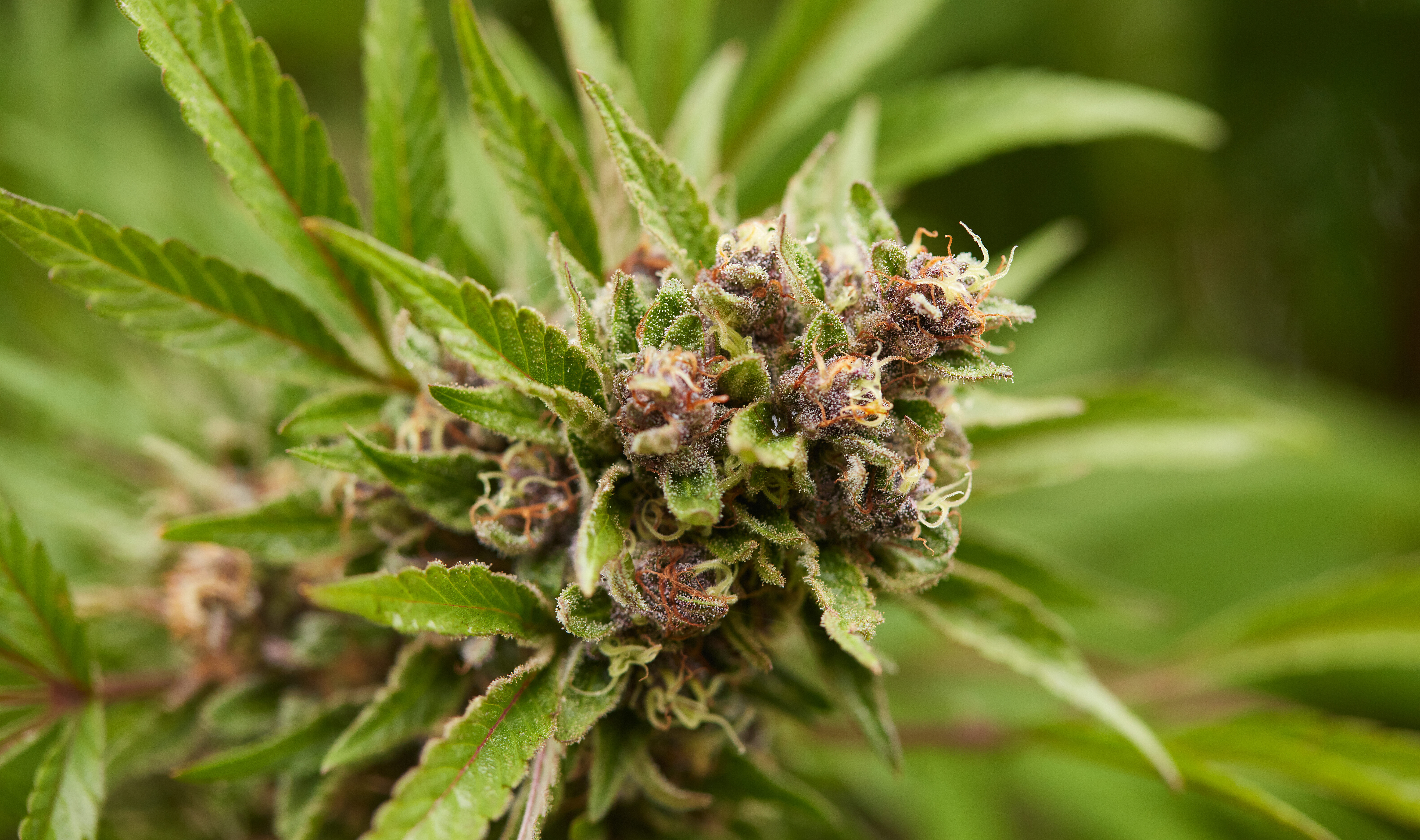Delta-8-tetrahydrocannabinol — aka delta-8 THC — is an intoxicating cannabinoid found in cannabis plants. Effects-wise, it's similar to delta-9 THC, but delta-8 is typically less potent per milligram. Though largely unregulated, this unique compound has gained popularity for its potential therapeutic benefits and milder intoxication.
Learn more about delta-8 THC and how it differs from other popular cannabinoids.
Is delta-8 THC synthetic?
Since it appears in such scant amounts in cannabis plants naturally, most delta-8 THC manufacturers synthesize it from cannabidiol (CBD), a non-intoxicating compound pulled from hemp plants. Due to its low natural concentration in weed plants, it's made by chemically converting CBD through a process known as isomerization.
So, while delta-8 THC itself is a naturally occurring compound, the form you commonly find is usually derived through synthetic methods, and it's often available and purchased in a semi-synthetic form.
Delta-8 vs. delta-9: What's the difference?
You can compare these two compounds in a few different ways:
Chemical structure
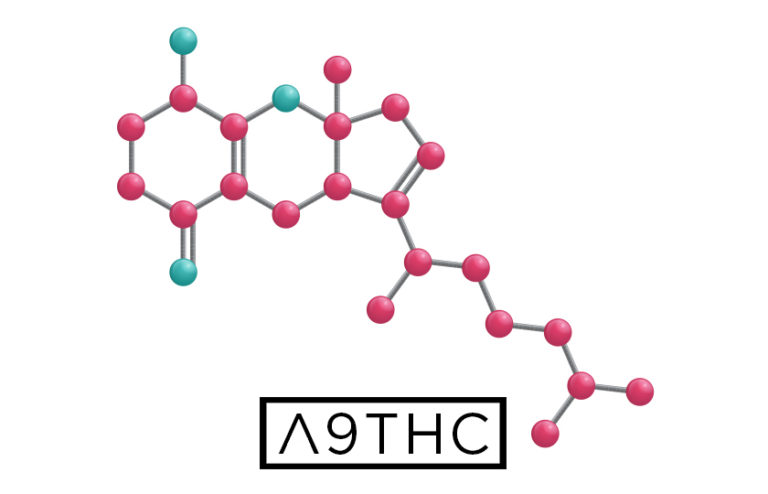 Photo by: Weedmaps
Photo by: WeedmapsImage lightbox

From a chemical or structural perspective, delta-8-THC differs from delta-9-THC due to the location of a critical chemical bond. Both forms of THC contain double bonds in their molecular chain.
- Delta-8-THC: contains a double bond on the eighth carbon chain
- Delta-9-THC: contains a double bond on the ninth carbon chain
Although it seems like a subtle difference, it has a major impact on the shape of these molecules. This shape directly determines how well the molecules can bind to your body's endocannabinoid receptors.
Molecular stability
On a molecular level, delta-9-THC is less stable than delta-8-THC. The delta-9-THC in weed easily oxidizes, eventually becoming cannabinol (CBN) or delta-8-THC the longer it sits on the shelf. Delta-8-THC is stable, does not oxidize to become CBN, and boasts a prolonged shelf life.
Affinity for cannabinoid receptors
When you use delta-8-THC, it binds to the CB1 receptor much in the same way delta-9-THC does, but its affinity for the receptor is different due to its slightly altered molecular structure. The CB1 receptor is responsible for mediating most of the psychotropic effects of THC. This differential binding may be responsible for delta-8 THC's reportedly clearer, less anxious high. It's also possible that delta-8-THC's molecular structure affects how it interacts with other receptors and neural pathways.
Effects
 Photo by: Gina Coleman/Weedmaps
Photo by: Gina Coleman/WeedmapsImage lightbox

Plenty of clinical and anecdotal evidence points to delta-9 THC having intoxicating effects when you inhale it or ingest it. We know very little about the effects of delta-8-THC, though some anecdotally report that delta-8-THC produces a milder, “clearer” high than delta-9-THC. Pharmacologically, delta-8-THC edibles function very similarly to delta-9-THC edibles, with both molecules converting into 11-hydroxy-THC in the liver.
There is so much we have yet to learn about delta-8-THC, and since the effects are different depending on whether it's ingested or inhaled, it's wise to treat these products with the same caution you would treat THC products.
Delta-8 vs. delta-10 THC: What's the difference?
Delta-8 and delta-10 THC are both cannabinoids found in the cannabis plant, but like it's comparison to delta-9 THC, these compounds differ in their chemical structures and effects:
Chemical structure
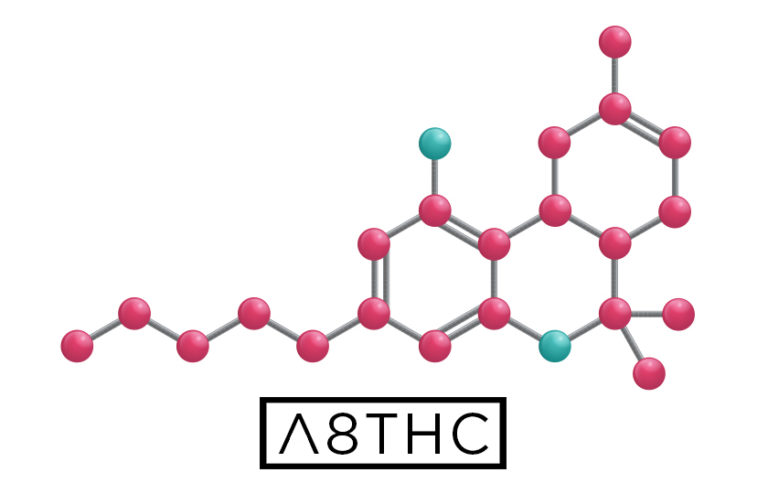 Photo by: Weedmaps
Photo by: WeedmapsImage lightbox

As with delta-8 and delta-9, the double bond on delta-10 lies on the tenth carbon atom. This slight variation significantly influences how each compound interacts with your body's endocannabinoid system.
Effects
Delta-8 THC is popular for its intoxicating effects, although it is generally considered less potent than delta-9 THC. However, delta-10 THC is thought to be even less intoxicating than delta-8 and is often associated with more energetic and euphoric effects.
Legality
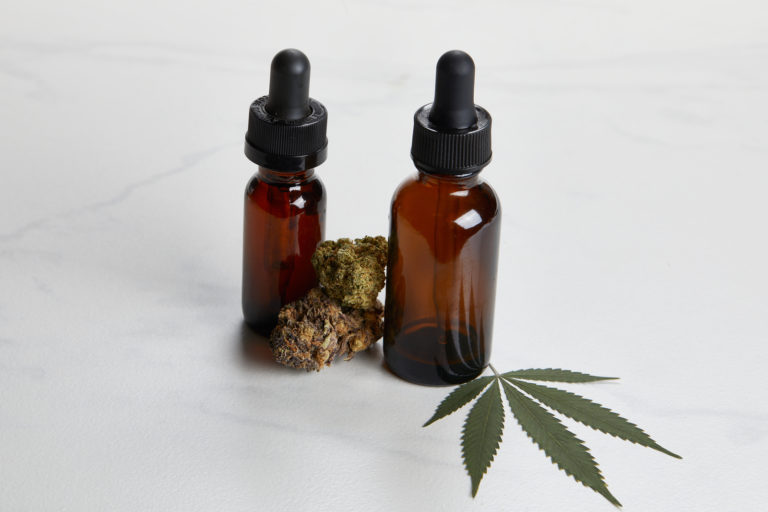 Photo by: Gina Coleman/Weedmaps
Photo by: Gina Coleman/WeedmapsImage lightbox

Thanks to the 2018 Farm Bill, you can likely buy delta-8 and delta-10 THC products derived from hemp across the US, but exercise caution. These products are unregulated and often are contaminated with unknown compounds that result from the isomerization process. The legality of both commercial delta-8 and delta-10 THC can be complex and varies depending on your region. There's a legal gray area due to their association with cannabis and hemp, as well as differing regulations regarding cannabinoids derived from these plants.
Potential benefits
Researchers are looking into both compounds for their potential therapeutic benefits. Delta-8 shows promise with its potential anti-nausea, anti-anxiety, appetite-stimulating, and pain-relieving properties. Delta-10's effects are less studied but may offer similar benefits.
Delta-8 vs. CBD: What's the difference?
Delta-8 THC and CBD also have distinct differences:
Chemical structure
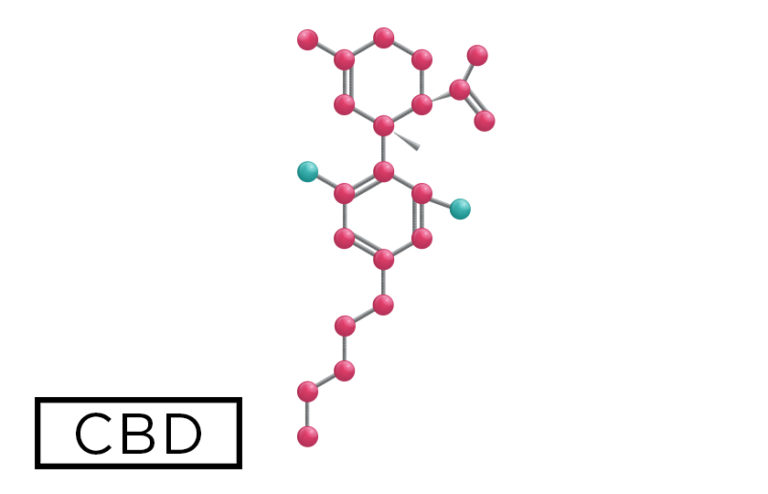 Photo by: Weedmaps
Photo by: WeedmapsImage lightbox

Both have different chemical structures, which is why they interact differently with the body's endocannabinoid system. Delta-8 THC binds to the CB1 and CB2 receptors in the nervous system, similar to other forms of THC, while CBD has a more indirect interaction with these receptors.
Effects
Delta-8 THC is intoxicating, meaning it can produce a "high," though generally reported as more subdued. People use delta-8 THC for its mild intoxicating effects, potential pain relief, appetite stimulation, and anti-nausea properties. By contrast, CBD is non-psychoactive, which means it doesn't cause a high. CBD has various health and wellness purposes, including managing anxiety, pain, inflammation, and some seizure disorders.
Natural presence in cannabis plants
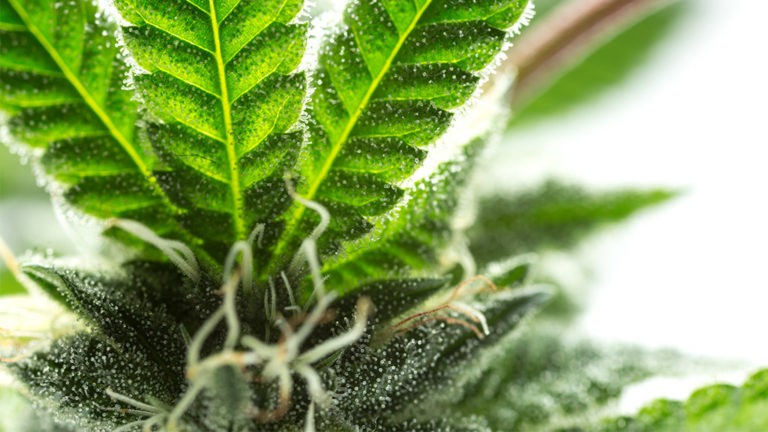 Photo by: Gina Coleman/Weedmaps
Photo by: Gina Coleman/WeedmapsImage lightbox

Delta-8 THC, while naturally present in cannabis in very low concentrations, is often processed from CBD due to this scarcity. CBD is abundantly found in hemp plants and can be extracted in large amounts.
Legality
The legality of delta-8 THC can be complex because it's often synthesized from hemp-derived CBD, which is legal in many places, but synthesized delta-8 might not be legal everywhere due to its intoxicating nature. CBD derived from hemp — with less than 0.3% delta-9 THC by weight — is legal in the US thanks to the 2018 Farm Bill.
Does delta-8 get you high?
Potentially. If you've ever gotten high from consuming delta-9 THC, there's a good chance you'll get high from delta-8. However, delta-8 THC's effects are generally considered to be less potent than those of delta-9 THC. The high from delta-8 THC is reportedly milder, with fewer anxiety-inducing effects compared to delta-9 THC.
There's a simple reason for this. Delta-8 THC binds to cannabinoid receptors in the brain similarly to delta-9 THC, but due to a slightly different chemical structure, delta-8's interaction with these receptors is less intense. This results in a more subdued, clear-headed experience, often described as relaxing without overwhelming euphoria or impairment. That said, the intensity of the high can vary based on several factors, including your tolerance, dosage, and method of consumption. Approach delta-8 THC cautiously or not at all, especially if you're trying THC products for the first time, as it's widely unregulated.
How delta-8 THC affects the body
A range of preclinical and clinical studies are uncovering some of the unique ways delta-8-THC interacts with the human body.
- Anxiety: According to the US National Library of Medicine, delta-8-THC displays anxiety-reducing qualities similar to delta-9-THC. Anecdotal reports claim that the consumption of delta-8-THC results in a calm, focused high, but we need more clinical research into its anti-anxiety potential before drawing any conclusions.
- Loss of appetite: Delta-8-THC may help stimulate appetite. The research found that a low dose of delta-8-THC administered to mice over 50 days resulted in a 22% increase in food intake compared with controls. The research also reported that delta-8-THC increased food intake significantly more than delta-9-THC, a known appetite stimulant.
- Nausea: The nausea-fighting potential of delta-8-THC was reported in a 1995 study published in Life Sciences. The study followed eight pediatric cancer patients over two years. They received tested and regulated pure delta-8-THC produced in an academic laboratory, and researchers found that no vomiting occurred when patients ingested delta-8-THC before and for 24 hours after cancer treatment. The study reported very few side effects.
- Pain and inflammation: A 2018 preclinical study published in Cannabis and Cannabinoid Research found that delta-8-THC may help diminish pain and inflammation in corneal injury in mice. The research found that delta-8-THC, applied topically, assisted in pain reduction and reduced inflammation through its effects on the CB1 receptors.
Delta-8 THC side effects and risks
Although most users report that delta-8 THC has milder intoxicating effects compared to delta-9 THC, it still comes with potential side effects and risks:
- Anxiety: While less common compared to delta-9 THC, some users may still experience anxiety, paranoia, or panic, especially at higher doses.
- Dry mouth: Common with many cannabinoids, users might experience dry mouth and dry eyes after using delta-8 THC.
- Dizziness and headaches: Some people might experience dizziness or headaches, particularly at higher doses or if they are new to THC products.
- Impaired coordination: Like other THC compounds, delta-8 can impair motor skills and reaction time, making activities like driving or operating heavy machinery risky.
- Increased heart rate: THC can cause a temporary increase in heart rate, which might be dangerous for individuals with heart conditions.
- Interactions with medications: Delta-8 THC could interact with other medications, altering their effects. It's important to consult with a healthcare provider before using delta-8 THC, especially if you are taking other medications.
- Legal risks: The legality of delta-8 THC is complex and varies by jurisdiction. In some places, its legal status is ambiguous, or it's outright banned, posing legal risks.
- Nausea and vomiting: Although delta-8 THC is often used to combat nausea, in some cases, especially with high doses, it may cause nausea and vomiting.
- Potential contaminants: Due to the lack of regulation on delta-8 THC products, there is no guarantee of safety, and impurities and inaccurate labeling are common, which may lead to unexpected or unwanted effects.
Is delta-8 THC legal?
Delta-8's legal status is complex, largely due to differing regulations between states and its ambiguous classification in US federal law. These products occupy a legal gray area because they're synthesized from hemp-derived CBD, which is legal under the 2018 Farm Bill. However, because it is intoxicating, some states have specifically outlawed or regulated it, so look up your local laws to see where delta-8 lies.
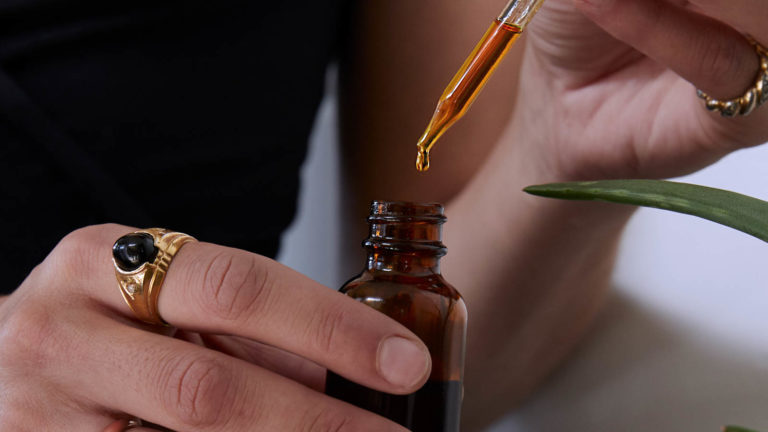 Photo by: Gina Coleman/Weedmaps
Photo by: Gina Coleman/WeedmapsImage lightbox

However, as for purchasing delta-8 products right now, you may be risking more than the law, “I do not recommend using delta-8 or its derivatives,” said Bonni Goldstein, MD, owner and medical director of CannaCenters, and medical advisor to Weedmaps. “Based on the limited research, delta-8 is a useful compound and is not a problem if it's in a clean product. I have no doubt that it offers benefits for anxiety, nausea, and other symptoms.”
“The issues lie with the unregulated manufacturing process of delta-8, which results in the production of synthetic cannabinoids. Products that claim to be tested may not be testing for these synthetics,” Dr. Goldstein warns, “which have been associated with severe depression, suicidal thoughts, and psychosis. Mother Nature gives us what we need in the plant, and until these synthetic products are regulated with reliable testing, I encourage people to use cannabinoids that come directly from the plant and to use products from licensed dispensaries where there is a high degree of confidence that the products are tested and regulated for consumer safety."
Bottom line
Delta-8 THC reportedly offers a milder intoxicating experience compared to its more famous counterpart, delta-9 THC. It's gaining popularity for its potential therapeutic benefits, including pain relief, anxiety reduction, and appetite stimulation; however, its legal status is complex and varies by region, often existing in a gray area due to its synthesis from legal hemp-derived CBD. Delta-8 THC products should be approached with caution since they are mostly unregulated.
FAQ
Is delta-8 safe?
Since it's a minor cannabinoid, we have much more to learn about delta-8-THC, which necessitates a cautious approach toward using it. Presently, the cannabinoid is generally available in concentrated forms because cannabis flower usually contains less than 1% delta-8-THC. To acquire a substantial quantity of this cannabinoid, a significant amount of extraction and refinement must take place. Right now, there is no way to know, even with third-party testing, that these products are what they claim to be.
How can you detect delta-8-THC in cannabis products?
To check the percentage of delta-8 THC, read the certificate of analysis linked to the product.
This article was reviewed by Bonni Goldstein, MD, a physician specializing in cannabis medicine in Los Angeles, California, owner and medical director of CannaCenters, and medical advisor to Weedmaps.com.

